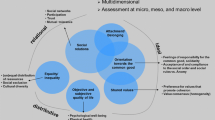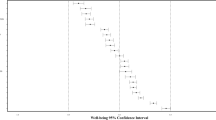Abstract
Previous studies examining the impact of social trust on happiness often face the difficulties of tackling the problems of potential endogeneity. Using an instrumental variables strategy and a two-stage residual inclusion approach, this paper explores the causal impact of social trust on individual happiness in China. We find robust evidence that a positive, causal relationship between social trust and happiness exist in China. We also find significant heterogeneity in the impact across genders and places of residence. The happiness of males and urban residents is more likely to be affected by social trust, compared to the happiness of female and rural residents, respectively. We further show that the key mechanisms through which social trust affects happiness are changes in self-reported health, social ties, perceived fairness of the society and subjective socioeconomic status.

Similar content being viewed by others
References
Abdel-Khalek, A. M. (2006). Measuring happiness with a single-item scale. Social Behavior and Personality: An International Journal,34(2), 139–150.
Alesina, A., & La Ferrara, E. (2002). Who trusts others? Journal of Public Economics,85(2), 207–234.
Arampatzi, E., Burger, M. J., & Novik, N. (2018). Social network sites, individual social capital and happiness. Journal of Happiness Studies,19(1), 99–122.
Bartolini, S., Bilancini, E., & Pugno, M. (2013). Did the decline in social connections depress Americans’ happiness? Social Indicators Research,110(3), 1033–1059.
Bartolini, S., Mikucka, M., & Sarracino, F. (2017). Money, trust and happiness in transition countries: Evidence from time series. Social Indicators Research,130(1), 87–106.
Bjørnskov, C. (2003). The happy few: Cross-country evidence on social capital and life satisfaction. Kyklos,56(1), 3–16.
Bjørnskov, C. (2008). Social capital and happiness in the United States. Applied Research in Quality of Life,3(1), 43–62.
Churchill, A. S., & Mishra, V. (2017). Trust, social networks and subjective wellbeing in China. Social Indicators Research,132(1), 313–339.
D’Hombres, B., Rocco, L., Suhrcke, M., & McKee, M. (2009). Does social capital determine health? Evidence from eight transition countries. Health Economics,19, 56–74.
De Silva, M. J. (2005). Social capital and mental illness: a systematic review. Journal of Epidemiology and Community Health,59(8), 619–627.
Delhey, J., & Dragolov, G. (2016). Happier together. Social cohesion and subjective well-being in Europe. International Journal of Psychology,51(3), 163–176.
Easterlin, R. A. (1974). Does economic growth improve the human lot? Some empirical evidence. Nations and Households in Economic Growth,89, 89–125.
Easterlin, R. A. (2001). Income and happiness: Towards a unified theory. The Economic Journal,111(473), 465–484.
Ekici, T., & Koydemir, S. (2014). Social capital, government and democracy satisfaction, and happiness in Turkey: A comparison of surveys in 1999 and 2008. Social Indicators Research,118(3), 1031–1053.
Ferrer-i-Carbonell, A., & Frijters, P. (2004). How important is methodology for the estimates of the determinants of happiness? The Economic Journal,114(497), 641–659.
Fuller-Iglesias, H. R. (2015). Social ties and psychological well-being in late life: The mediating role of relationship satisfaction. Aging and Mental Health,19(12), 1103–1112.
Haller, M., & Hadler, M. (2006). How social relations and structures can produce happiness and unhappiness: An international comparative analysis. Social Indicators Research,75(2), 169–216.
Han, S. (2015). Social capital and subjective happiness: Which contexts matter? Journal of Happiness Studies,16(1), 241–255.
Hausman, J. A. (1978). Specification tests in econometrics. Econometrica: Journal of the Econometric Society,46, 1251–1271.
Helliwell, J. F., Huang, H., & Wang, S. (2014). Social capital and well-being in times of crisis. Journal of Happiness Studies,15(1), 145–162.
Helliwell, J. F., & Putnam, R. D. (2004). The social context of well-being. Philosophical Transactions of the Royal Society B: Biological Sciences,359(1449), 1435–1446.
Hommerich, C., & Tiefenbach, T. (2018). Analyzing the relationship between social capital and subjective well-being: The mediating role of social affiliation. Journal of Happiness Studies,19(4), 1091–1114.
Huang, J. (2019). Income inequality, distributive justice beliefs, and happiness in China: Evidence from a Nationwide Survey. Social Indicators Research,142, 83–105.
Jiang, S., Lu, M., & Sato, H. (2012). Identity, inequality, and happiness: Evidence from urban China. World Development,40(6), 1190–1200.
Knack, S., & Keefer, P. (1997). Does social capital have an economic payoff? A cross-country investigation. The Quarterly Journal of Economics,112(4), 1251–1288.
Knight, J., & Gunatilaka, R. (2010). Great expectations? The subjective well-being of rural-urban migrants in China. World Development,38(1), 113–124.
Knight, J., Song, L., & Gunatilaka, R. (2009). Subjective well-being and its determinants in rural China. China Economic Review,20(4), 635–649.
Kuroki, M. (2011). Does social trust increase individual happiness in Japan? Japanese Economic Review,62(4), 444–459.
Liu, H., & Zhao, Z. (2014). Does health insurance matter? Evidence from China’s urban resident basic medical insurance. Journal of Comparative Economics, 42(4), 1007–1020.
Liang, Q., Huang, Z., Lu, H., & Wang, X. (2015). Social capital, member participation, and cooperative performance: Evidence from China’s Zhejiang. International Food and Agribusiness Management Review,18(1), 49–78.
Maass, R., Kloeckner, C. A., Lindstrøm, B., & Lillefjell, M. (2016). The impact of neighborhood social capital on life satisfaction and self-rated health: A possible pathway for health promotion? Health & Place,42, 120–128.
Newton, K. (2001). Trust, social capital, civil society, and democracy. International Political Science Review,22(2), 201–214.
Ng, Y. K. (1997). A case for happiness, cardinalism, and interpersonal comparability. Economic Journal,107, 1848–1858.
Ng, S. T., Tey, N. P., & Asadullah, M. N. (2017). What matters for life satisfaction among the oldest-old? Evidence from china. PLoS ONE,12(2), e0171799.
Oshio, T. (2017). Which is more relevant for perceived happiness, individual-level or area-level social capital? A multilevel mediation analysis. Journal of Happiness Studies,18(3), 765–783.
Putman, R. D. (2000). Bowling alone: The collapse and revival of American community. New York: Simon & Schuster.
Putnam, R. D. (1995). Bowling alone: America’s declining social capital. Journal of Democracy,6(1), 65–78.
Ram, R. (2010). Social capital and happiness: Additional cross-country evidence. Journal of Happiness Studies,11(4), 409–418.
Rodríguez-Pose, A., & von Berlepsch, V. (2014). Social capital and individual happiness in europe. Journal of Happiness Studies,15(2), 357–386.
Ronconi, L., Brown, T. T., & Scheffler, R. M. (2012). Social capital and self-rated health in Argentina. Health Economics,21(2), 201–208.
Steinhardt, C. (2012). How is high trust in China possible? Comparing the origins of generalized trust in three Chinese societies. Political Studies,60(2), 434–454.
Subramanian, S. V., Kim, D. J., & Kawachi, I. (2002). Social trust and self-rated health in US communities: a multilevel analysis. Journal of Urban Health,79(4), S21–S34.
Sztompka, P. (1998). Trust, distrust and two paradoxes of democracy. European Journal of Social Theory,1(1), 19–32.
Terza, J. V., Basu, A., & Rathouz, P. J. (2008). Two-stage residual inclusion estimation: Addressing endogeneity in health econometric modeling. Journal of Health Economics,27(3), 531–543.
Thoits, P. A. (2011). Mechanisms linking social ties and support to physical and mental health. Journal of Health and Social Behavior,52(2), 145–161.
Tsai, W., & Ghoshal, S. (1998). Social capital and value creation: The role of intrafirm networks. Academy of Management Journal,41(4), 464–476.
Veenhoven, R. (1991). Is happiness relative? Social Indicators Research,24(1), 1–34.
Winkelmann, R. (2009). Unemployment, social capital, and subjective well-being. Journal of Happiness Studies,10(4), 421–430.
Woolcock, M., & Narayan, D. (2000). Social capital: Implications for development theory, research, and policy. The World Bank Research Observer,15(2), 225–249.
Wooldridge, J. (2010). Econometric analysis of cross sectional and panel data. Cambridge: MIT Press.
Yamamura, E., Tsutsui, Y., Yamane, C., Yamane, S., & Powdthavee, N. (2015). Trust and happiness: comparative study before and after the great east Japan earthquake. Social Indicators Research,123(3), 919–935.
Yasuharu, T., Seiji, F., & Takashi, I. (2010). Individual and country-level effects of social trust on happiness: The Asia Barometer Survey. Journal of Applied Social Psychology,40(10), 2574–2593.
Yip, W., Subramanian, S. V., Mitchell, A. D., Lee, D. T., Wang, J., & Kawachi, I. (2007). Does social capital enhance health and well-being? Evidence from rural China. Social Science and Medicine,64(1), 35–49.
Zhang, Z., & Zhang, J. (2015). Social participation and subjective well-being among retirees in China. Social Indicators Research,123(1), 143–160.
Acknowledgements
We are grateful to the Co-Editor (Stephanie Rossouw) and two anonymous referees for helpful comments. Haiyang Lu acknowledges the financial support by the National Natural Science Foundation of China (Grant No. 71603052), Humanity and Social Science Youth Foundation of Ministry of Education (Grant No. 16YJCZH065), and Project of Outstanding Research Talents of Fujian Agriculture and Forestry University (Grant No. xjq201631). Rong Zhu acknowledges the financial support by the Australian Research Council Linkage Project (ARC LP170100718). The data set used in this study was provided by the Center for Social Science Survey at Sun Yat-Sen University, and raw data can be applied via official email (cssdata@mail.sysu.edu.cn). The usual disclaimer applies.
Author information
Authors and Affiliations
Corresponding author
Additional information
Publisher's Note
Springer Nature remains neutral with regard to jurisdictional claims in published maps and institutional affiliations.
Rights and permissions
About this article
Cite this article
Lu, H., Tong, P. & Zhu, R. Longitudinal Evidence on Social Trust and Happiness in China: Causal Effects and Mechanisms. J Happiness Stud 21, 1841–1858 (2020). https://doi.org/10.1007/s10902-019-00159-x
Published:
Issue Date:
DOI: https://doi.org/10.1007/s10902-019-00159-x




